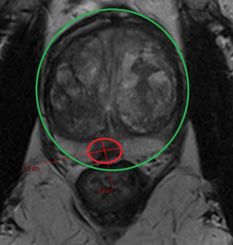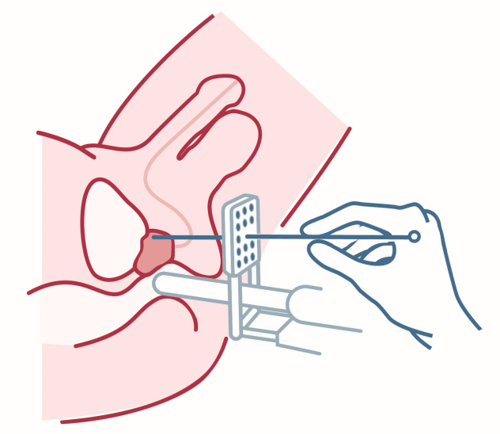Prostate biopsy
What is a biopsy?
A prostate biopsy is the removal of prostate tissue for further analysis. We will take a biopsy if there is a reason to suspect the presence of prostate cancer. We take tissue samples from the most suspicious areas by projecting MRI scan imaging, which helps us find the right areas for the biopsies. These are called fusion biopsies. We also take biopsies from certain areas where prostate cancer often occurs but does not always show up on MRI scans.

Example of an MRI scan of the prostate
The procedure
You will be lying on a special examination table with your legs held in the leg supports. Before taking the biopsies, your urologist will use a finger to examine the prostate through the anus, and the skin of your perineum (the region between the testicles and anus) will be disinfected.
All biopsies at the Netherlands Cancer Institute are taken through the perineum. We use a thin needle to numb the skin and the tissue between the perineum and prostate, after which we use a needle to take the biopsies. This needle is inserted through the perineum with great precision. We use an ultrasound inserted into the anus to follow the path of the needle to determine the exact location of the biopsies.
Transperineal prostate biopsies have clear advantages over prostate biopsies taken through the colon. Transperineal prostate biopsies are less painful and more precise, and the risk of infection is much lower. That's why transperineal prostate biopsies are the standard at the Netherlands Cancer Institute.

Illustration prostate biopsy
After the procedure
After the procedure, you can go home. Some people are lightheaded after the procedure. Please consider bringing someone with you who can take you home, as driving or biking is not recommended after the procedure.
Results
Your practicing physician will discuss the results with you during a phone consultation. Depending on your results you may require additional examinations or a consultation to discuss a potential treatment plan.
During the days following the procedure, you may notice some blood in your urine. You may find blood in your sperm up to 8 weeks after the procedure. This is not a problem. If you are in pain you can freely take paracetamol. In case the following symptoms occur, please contact us immediately:
- Fever higher than 38.5 °C
- The urge to urinate but not being able to
- Too much blood (the color of red wine) or blood clots in the urine
 nl
nl
 Nederlands (Nederland)
Nederlands (Nederland)
 English (United States)
English (United States)